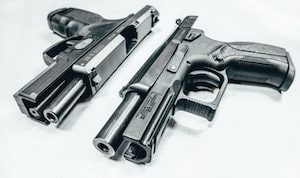Since 1993
Some Basics of Carrying a Concealed Firearm Charge

Section 790.001(2) of the Florida Statutes prohibits the carrying of a firearm in a manner that conceals the firearm from another person’s ordinary sight. It’s this “ordinary sight” phrase that can be somewhat confusing, especially in cases where police actually “see” a gun, but then later claim that the gun they “saw” was concealed. Sounds like double-speak to me, so let’s break some of the basics.
The Florida Supreme Court case of Dorelus v. State, 747 So.2d 368 (Fla. 1999) analyzed the basics, reiterating that “As was stated over a century ago, the prohibition against carrying concealed weapons is designed to prevent a person with a weapon from “taking some undue advantage over an unsuspecting adversary,” who is not aware that the person is carrying a weapon.” Sutton v. State, 12 Fla. 135, 136 (1867). That’s right, you saw it, a 1999 court citing a 1867 decision, that’s still good law (mark your calendar).
So, as happens so often in Orlando, an officer pulls over a car, issues a traffic citation, and notices the butt of a gun sticking out from somewhere–eventually leading to an arrest on a concealed firearm charge. As per the definition of concealed, the gun must be concealed from ‘ordinary sight’, and how can it be if the officer sees it???? The Dorelus court reasons that “although the observations of the police officer will not necessarily be dispositive, a statement by the observing officer that he or she was able to “immediately recognize” the questioned object as a weapon may conclusively demonstrate that the weapon was not concealed as a matter of law because it was not hidden from ordinary observation.” Id at 372.
Such a basic concealed issue was addressed in Powell v. State, 369 So. 2d 108 (Fla. 1st DCA 1979), where a patrol officer noticed Powell walking with the butt of chrome-plated firearm protruding from his pocket. The court in Powell overturned his conviction for carrying a concealed firearm based upon the fact that the weapon was not concealed from the ordinary sight of another person. Id.
These issues of concealment are tricky. Each case is different, but it’s safe to say that the more “immediately recognizable” a weapon is, the less likely it is to be found concealed. The question from a defense lawyer standpoint becomes one of whether or not the facts are ripe for a judgement of acquittal, or a (c)(4) Motion to Dismiss, as the Dorelus case says that (c)(4) motions can be an appropriate means to decide this issue. When confronted with such issues, simply pick up the phone and call your favorite Orlando defense attorney, we’ll discuss your options.








